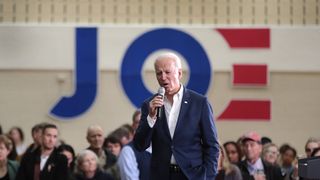The great American historian Richard Hofstadter described Franklin Delano Roosevelt's New Deal as having a "social democratic tinge". However, since Roosevelt's presidency in the 1930s and early 1940s, social democratic ideas have struggled to have much influence on American public policy. Socialist ideas have had even less influence. There are signs that this is changing: in the primaries of 2016 the popularity of the self-confessed democratic socialist Bernie Sanders and the social democrat Elizabeth Warren suggested Americans were opening their minds up to different economic and political approaches.
Of course, neither of them was ultimately victorious in the Democratic primaries, but the enthusiasm they engendered and the number of votes they received was remarkable in a country that has long been so hostile and unreceptive to left-wing ideas. Undoubtedly, Sanders' and Warren's campaigns pulled Joe Biden's candidacy significantly to the left, making him a more progressive candidate than Barack Obama was in either 2008 or 2012, when he campaigned as a centrist Democrat.
Promoting bipartisanship as a campaign slogan is possibly excusable, but actually believing the Republicans are willing to support expanding Obamacare, raising the minimum wage, facing up to global warming with serious policies, or increasing taxes to fund the sensible governing of America is deluded.
A fascinating question to consider is: could the Biden presidency be the most social democratic administration since FDR, or is Biden more likely to retreat to the cautious centre - the position Obama largely occupied? One sign that a Biden administration would be light on serious reform is his claim that he can achieve bipartisan policy changes in Washington. Promoting bipartisanship as a campaign slogan is possibly excusable, but actually believing the Republicans are willing to support expanding Obamacare, raising the minimum wage, facing up to global warming with serious policies, or increasing taxes to fund the sensible governing of America is deluded.
Obama, in his 2008 campaign and his accompanying book, The Audacity of Hope, claimed his skills as a community organiser and his experience in the Illinois Senate would help him achieve bipartisan reforms. An update on that book should be titled The Paucity of Evidence. This time around we have Biden claiming his 36-year career in the US Senate gives him the unique capacity to achieve bipartisan reforms. This remains unlikely until the Republicans experience an electoral shellacking.
The way Trump has handled the COVID-19 pandemic makes a landslide victory for Biden, and the Democrats in the Congress, possible - although far from inevitable. The American public, in polls, is increasingly blaming Trump and his Republican colleagues in the Congress for not solving America's major problems, and in fact often exacerbating many of those problems.
In such a political climate a Democrat-controlled Washington could seize the moment and push for widespread progressive reform. On the environment this is a matter of necessity, and should not be called progressive or left-wing, but simply sensible and in the national interest. The fact that objective science on climate change and now on COVID-19 has been labelled "left-wing" is a damning indictment of how divorced from facts both the Trump administration, and by enabling association, the current Republican party is.
The fact that objective science on climate change and now on COVID-19 has been labelled "left-wing" is a damning indictment of how divorced from facts both the Trump administration, and by enabling association, the current Republican party is.
American governments have long undermined their ability to solve basic problems by cutting the size and capacity of the public sector over several decades. This is the outcome of neoliberal thinking and the results of government services under pressure from the COVID-19 pandemic have been unimpressive. Of course, matters have been made much worse by a grossly incompetent and narcissistic president.
Trump's election was the result of both the perceived successes and failings of more laissez-faire and globalised economic policies enacted since Reagan was elected. Trump, it is worth remembering, received far more votes from wealthy white Republicans than he did from former factory workers. Many wealthy Americans voted for Trump because he continued the Republican tradition of promising tax cuts and deregulation. Somewhat contradictorily, he also promised tariffs and trade wars - the regulation of global trade - to appeal to poorer whites who are more financially insecure. All white voters were also presented with a strong dose of racism: they were told whatever problems they faced, or fears they had, it was principally immigrants, Muslims, Mexicans or the Chinese that were to blame.
Thomas Piketty, in his new book Capital and Ideology, argues for politics to return to being about serious policy choices. He makes the case for social democratic policies to address inequalities in wealth and income. There are good reasons for Americans to be more open to progressive ideas, as poverty and inequality rates in the US have consistently been the worst in the OECD in recent decades, whereas poverty and inequality rates have been the lowest in the social democratic nations of Europe. We tabulated the data to demonstrate this in our recent book How America Compares.
It is not too far-fetched to imagine a Biden White House facing up to these facts and exploring ideas like increasing inheritance tax and creating a wealth tax. It is likely that medical coverage would become more universal under Biden, and even ideas like free college education and a Universal Basic Income are on the table. The sudden serious consideration of these ideas in America is a cause for optimism. More pessimistically, the American political system is structured to block significant change, and one party calling the shots. Therefore, sweeping progressive reform is unlikely without landslide victories to Biden and the Democrats in November.






